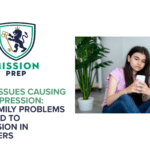When you’re pregnant, you dream of the child they’ll become—their laughter, the activities they’ll love, their unique personality shining through. You picture all the milestones, from their first steps to their first day of school, and imagine the joy they’ll bring into your life.
What you likely didn’t imagine is that one day, your teenager might struggle with depression.
It’s not something any parent plans for, but if you’re facing this, know that you’re not alone. This blog will walk you through what to do if you think your teenager is depressed and how to support them at home.
And if you feel they need professional help, Mission Prep is here to guide both you and your teen through this challenging time. We’ll be with you every step of the way.
Understanding Teen Depression
Depression in teens is a complex and layered issue that goes beyond mere sadness. It’s a persistent cloud that can cast a shadow over daily life, affecting everything from friendships to academic performance.
Recognizing the difference between normal teenage mood swings and depression is crucial.
Signs to Watch For:
Teens are known for their ups and downs, so how can you tell if your child is just having a rough week or if they’re truly depressed? Here are some common signs of depression to watch for:
- Sudden changes in mood or behavior: Is your usually upbeat teen suddenly irritable or withdrawn?
- Withdrawing from family and friends: If your teen starts isolating themselves or avoids spending time with friends, it might be a red flag.
- Changes in sleep or eating habits: Look out for significant weight loss, weight gain, oversleeping, or insomnia.
- Loss of interest in activities: If your teen suddenly stops doing things they used to love—like sports, hobbies, or social events—something deeper could be going on.
- Difficulty concentrating: Depression can affect focus and decision-making, which can lead to academic or behavioral problems at school.
The tricky part? Some of these behaviors can also be normal teenage stuff. But if the signs last for more than a few weeks or seem severe, it’s worth taking a closer look.
Taking Action at Home
Once you’ve identified potential signs, the next step is approaching your teen with care and offering support.
Creating an Open Environment
Start by creating a space where your teen feels safe to express themselves. Encourage dialogue with open-ended questions like, “I’ve noticed you seem down. Want to talk about it?” Listening without judgment is vital—sometimes, teens need to feel heard more than anything else.
Validating Their Feelings
Acknowledging your teen’s emotions is key. Avoid dismissive remarks like “It’s just a phase.” Instead, affirm their feelings with statements like, “I see you’re struggling, and I’m here for you.”
Promoting Healthy Habits
Encourage physical activity, balanced nutrition, and adequate sleep. Exercise releases endorphins, which naturally boost mood. Model these habits yourself to set a positive example.
Monitoring Social Media
Social media can be both a social lifeline and a source of stress. If your teen spends excessive time online or is affected by digital drama, consider setting boundaries on screen time.
Encouraging Creative Outlets
Creative activities can offer a safe space for expression. Whether it’s journaling, music, or art, encourage your teen to explore these outlets to process emotions healthily.
Knowing When to Seek Professional Help
Despite your best efforts, there may come a time when professional help becomes necessary.
Red Flags Indicating a Need for Professional Intervention
- Expressions of hopelessness, suicide or thoughts of self-harm.
- Reckless or dangerous behavior.
- Persistent symptoms despite home interventions.
Seeking professional help is a proactive, loving step. It indicates strength, not failure.
Exploring Professional Help Options
If your teen needs structured, intensive support beyond what you can provide, consider residential treatment options like Mission Prep.
Why Consider Residential Treatment?
For some teens, the immersive environment of residential treatment can be incredibly beneficial for their mental health and personal growth.
This type of program provides 24/7 supervision and support from trained professionals, ensuring that they are never alone in their struggles. In addition to constant oversight, these facilities often offer a structured schedule filled with therapeutic activities, group therapy sessions, and individual counseling.
This holistic approach helps teens develop coping strategies, build resilience, and connect with peers who understand their experiences, fostering a sense of community and belonging that is crucial for their recovery.
What Sets Mission Prep Apart?
- Round-the-Clock Care: Constant support offers peace of mind for parents.
- Individual and Group Therapy: Personalized and peer support help teens relate and heal.
- Skill Development: Teens learn coping mechanisms to manage depression.
- Self-Esteem Building: Focused programs help restore their sense of self-worth.
What to Expect from Residential Treatment
Comprehensive Care
Mission Prep offers well-rounded mental health support that looks at all aspects of your well-being—emotional, physical, and psychological. Our goal is to help you build resilience and achieve success after treatment.
Parental Involvement
You’re a key player in your teen’s recovery! Family therapy sessions and regular updates keep you involved in their healing journey and help strengthen your bond.
Transitioning Back Home
When your teen finishes treatment, Mission Prep gives you some helpful tips to support them as they transition back into everyday life.
Talking to Your Teen About Professional Help
Bringing up the topic of therapy or residential treatment can be daunting for many individuals, as it often touches on sensitive emotions and personal struggles.
It’s important to approach this conversation with care and empathy. Here are some thoughtful strategies to facilitate the discussion with sensitivity:
Addressing Concerns
Your teen may have fears about therapy or peer reactions. Listen to these concerns and reassure them that seeking help is a positive step.
Positioning Treatment as an Opportunity
Frame therapy or residential treatment as a chance to equip them with tools for happiness and confidence, not as a burden or punishment.
Reassuring Them About Residential Treatment
Communicate that places like Mission Prep are healing environments, not punitive ones. They’ll be surrounded by caring professionals and peers who understand their experiences and genuinely want to see them get better.
How Effective are Residential Treatment Programs?
Residential treatment programs, such as France’s “soins-études” from the Fondation Santé des Etudiants de France (FSEF), have shown to be incredibly effective in supporting young people dealing with mental disorders.
Similar to us here at Mission Prep, these programs combine intensive therapeutic care with educational support, addressing both mental health needs and educational goals. Research has shown that young people in these programs often experience substantial improvements in their mental health.
About 44-63% of participants noticed real improvements by the time they completed their stay, and the long-term results were even better, with 54-74% continuing to make progress years later. Many were also able to get back to school, training, or work, showing how effective these programs can be in helping them recover and reintegrate into society.
This example really highlights the importance of residential treatment programs in providing care that benefits teens both right away and in the long run.
Staying Connected During Their Journey
Your involvement remains crucial, even if your teen enters residential treatment. Staying engaged in their journey can provide them with the emotional support they need during this challenging time.
Stay Committed
Attend family sessions and maintain open communication. Your continued support is a vital component of their recovery.
Exercise Patience
Recovery from depression can be a non-linear process. There will be setbacks, but remember that progress takes time.
Foster a Supportive Home Environment
Post-treatment, continue practicing open communication and support. Reassure your teen that you’re there for them, always.
Conclusion
If you suspect your teen is depressed, trust your instincts and take action. Start with open communication at home, and if needed, seek professional assistance like the comprehensive care here at Mission Prep Residential Treatment.
Remember, you’re not alone in this challenge, and taking that first step can profoundly impact your teen’s wellbeing. Your love and support can make all the difference in their path to healing.





















